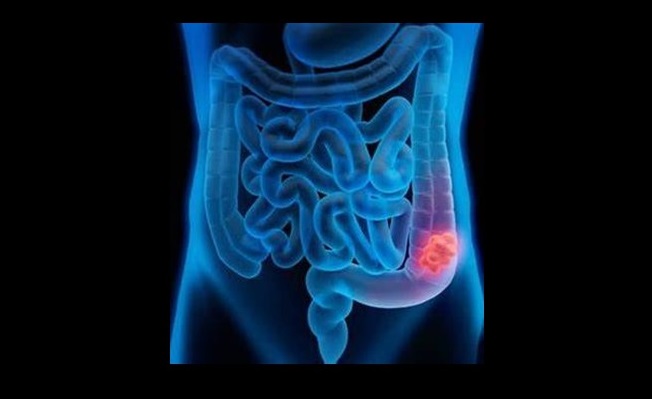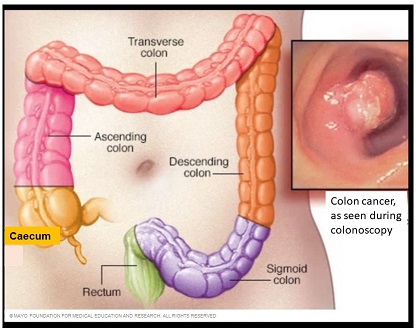
Colon cancer: Location representation
When Adeniran Chukwuemeka (not the real name) died one year ago, his family - unusual for an African family, was gracious to disclose his cause of death. It was colon cancer (also commonly referred to as bowel cancer).
‘Niran died, aged 62. He was a doctor and distinguished public health specialist.
His family felt that disclosing his cause of death will help to raise awareness about colon cancer in the community he grew up in and worked.
According to ‘Niran’s wife, her husband had been complaining of irregular stooling, occasional tummy pains and seeing blood in stool off and on for well over a year prior to his death.
“He believed he had hemorrhoids and considered his busy work-life schedule were to blame for his complaints”, said ‘Niran’s wife.
Even for a doctor, it never crossed ‘Niran’s mind that his complaints could indicate a more serious ailment. So, he never sought medical attention until it was too late.
By the time ‘Niran eventually visited his doctor to complain, he had started having more frequent and troublesome abdominal pain. The sighting of blood in stool were more consistent and sometimes continuous.
.jpg)
Eventually, ‘Niran was diagnosed with colon cancer for the first time three months prior to his death.
At the time Niran was taken to surgery, it was discovered that he had very advanced stage colon (lower bowel) cancer that had spread to involve many organs in his abdomen and his bones.
‘Niran’s wife said: “His doctor said he had stage IV colon cancer and surgery was suspended. Supportive medical treatment was substituted. He became poorly rapidly soon thereafter.”
“My husband’s doctor told me after his death, that ‘Niran could have been saved from bowel cancer if he had come up with his earlier complaints one year ago”, said ‘Niran’s wife.
“I urge everyone, male or female, in mid-life stage with history of any bowel complaints to go and get a doctor’s checkup regularly”.
“Early detection could have saved my husband”, she said.
Colon cancer is a type of cancer that begins in the large intestine (colon). About 65% of colon cancers occur in the rectum/sigmoid colon area and 15% in the ascending colon (see illustration). The colon and its different parts form the final part of the digestive tract.

Image showing different parts of the colon. Any part can be affected by colon cancer, but the recto-sigmoid colon is affected most. Image credit: Mayo Clinic
In Sub-Sahara Africa, colon cancer is considered to be the 5th commonest cancer with an estimated incidence rate of 4.04 per 100 000 population (4.38 for men and 3.69 for women).1 This is very likely an under-estimation.
Colon cancer typically affects older adults, though it can occur at any age. It usually begins as a small, noncancerous (benign) growth of cells called polyps that form on the inside of the colon. Over time some of these polyps can become colon cancers.
Polyps may be small and produce few, if any, symptoms. For this reason, doctors recommend regular screening tests to help prevent colon cancer by identifying and removing polyps before they turn into cancer.
As in the case of ‘Niran, the symptoms of bowel cancer can often be subtle and don’t necessarily make you feel ill.
More than 90 per cent of people that are diagnosed with bowel cancer will have one or more of the following symptoms:
Most people with these symptoms do not have bowel cancer.
If you experience one of more of these symptoms and they persist for more than four weeks, you are best advised to visit your doctor.
The cause of colon cancer is not known. In general colon cancer like most other cancers start when healthy cells develop abnormal changes (mutation) in their DNA. A cell’s DNA contains a set of instructions that tells the cells what to do.
In colon cancer, tansformative mutation is believed to occur in non-cancerous small tissues (polyps) that grow inside the inner lining of the large bowel (colon). If not detected early and removed, the polyps will become cancerous, spread beyond the colon and may eventually be a cause of death.
While the exact cause of bowel cancer is unknown, there are a number of factors that can increase your risk, including:
Estimating the incidence of colorectal cancer in Sub–Saharan Africa: A systematic analysis.
Published: February 22, 2020
Updated: July 2, 2024.
© 2024, Datelinehealth Africa Inc. All rights reserved.
Permission is given to copy, use and share content for non-commercial purposes without alteration or modification and subject to source attribution.
DATELINEHEALTH AFRICA INC., is a digital publisher for informational and educational purposes and does not offer personal medical care and advice. If you have a medical problem needing routine or emergency attention, call your doctor or local emergency services immediately, or visit the nearest emergency room or the nearest hospital. You should consult your professional healthcare provider before starting any nutrition, diet, exercise, fitness, medical or wellness program mentioned or referenced in the DatelinehealthAfrica website. Click here for more disclaimer notice.